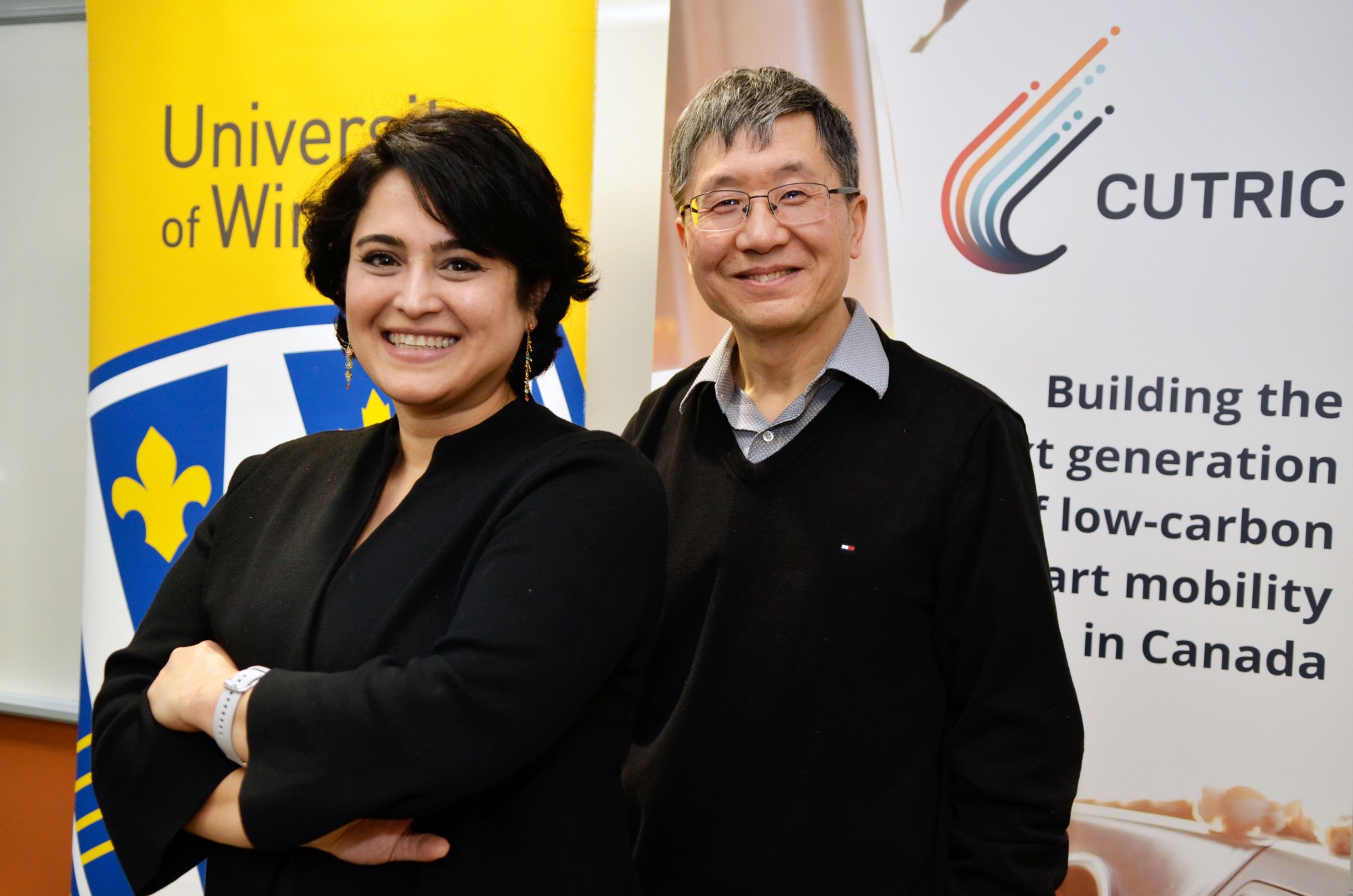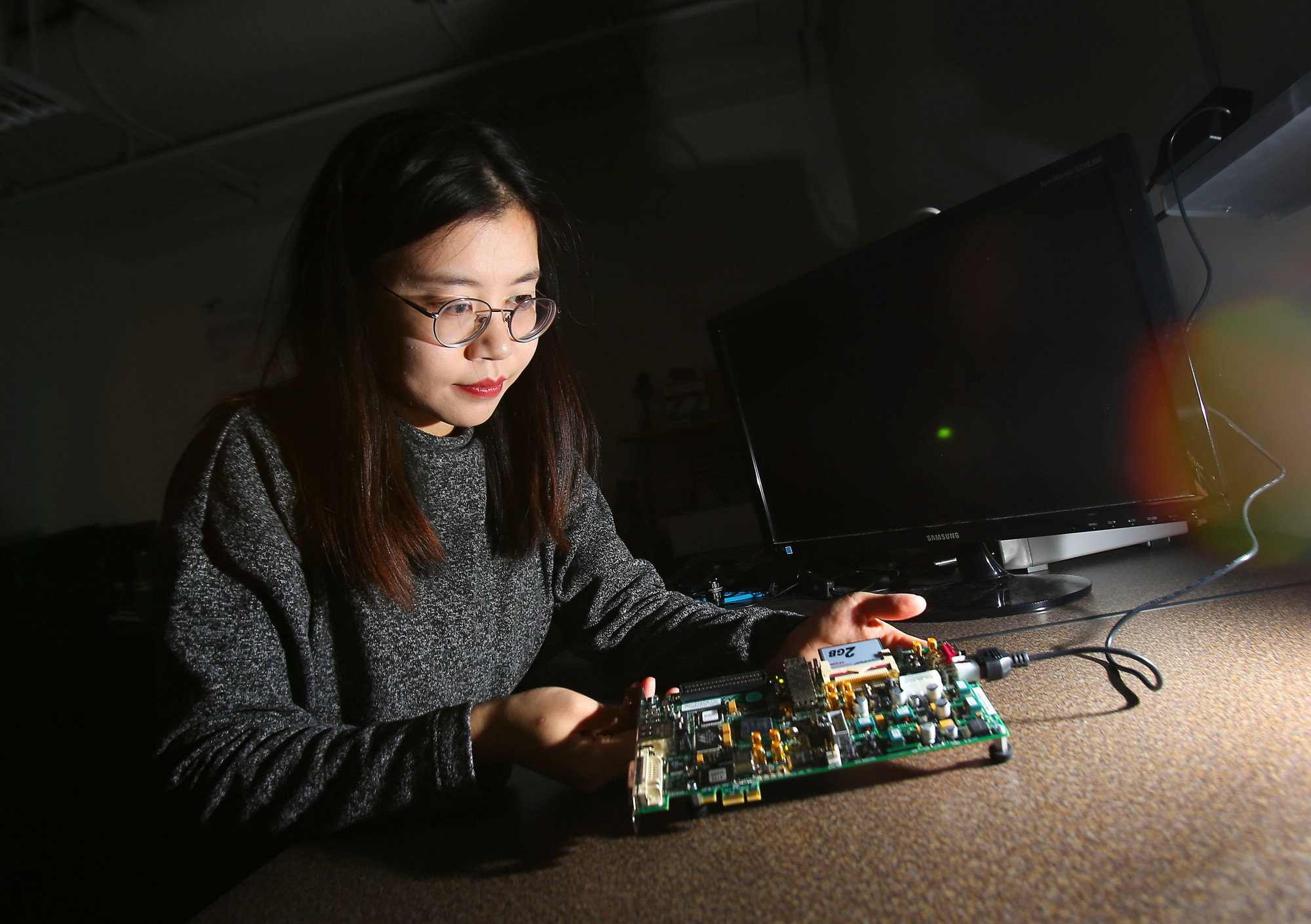 The University of Windsor will award an honorary degree to physician Caroline Hamm (pictured) and engineering professor emeritus Philip H. Alexander.
The University of Windsor will award an honorary degree to physician Caroline Hamm (pictured) and engineering professor emeritus Philip H. Alexander.
Oct 12th, 2022
The University of Windsor will award honorary degrees to physician Caroline Hamm and engineering professor emeritus Philip H. Alexander during its 118th Convocation celebration this weekend.
Dr. Hamm is chair of oncology at the Schulich School of Medicine’s Windsor Campus.
More than 2,300 students will gather at the newly-opened Toldo Lancer Centre (TLC) this Friday and Saturday for five sessions of University Convocation. She is the clinical research director of the Windsor Cancer Research Group, working to enhance both local and cross border research initiatives, chairs the Windsor Regional Hospital Research and Academic Committee, and leads the Complex Hematology Program development in Windsor.
— Published on Mar 2nd, 2023

The University of Windsor will host Canada’s first organization dedicated to countering threats to the connected transportation marketplace.
The SHIELD Automotive Cybersecurity Centre of Excellence will build the skills, innovations, and policy to secure and protect connected and autonomous vehicles. Led by researchers recognized for their excellence in the automotive industry, it will partner with industry, government, and community stakeholders to respond to an emerging transportation landscape driven by connections and sensors embedded in vehicles, infrastructure, and the manufacturing supply chain.
The co-founders and co-directors — Mitra Mirhassani of the Department of Electrical and Computer Engineering and Ikjot Saini of the School of Computer Science — note that modern vehicles have more than 100 million lines of computer coding and 20 sensors transmitting wireless data, with more connecting in every new vehicle.
“Hardware and software vulnerabilities could put personal information and vehicle safety in jeopardy,” says Dr. Mirhassani. “Transportation systems are especially susceptible to attacks from malicious actors due to the complexity, implementation costs, and lifecycles of equipment and platforms.”
— Published on Jan 28th, 2021

A screenshot shows the Ed Lumley Centre for Engineering Innovation students created in Minecraft.
The University of Windsor Engineering Students’ Society is bringing campus to the screens of students learning from home.
The society has created a replica of the University of Windsor campus on Minecraft — a video game that allows you to create a virtual world with Java programming.
Students can explore each floor of the Ed Lumley Centre for Engineering Innovation and take a stroll through UWindsor’s campus peppered with lush trees, flower beds and even its Promise campaign billboards.
“Since we are all stuck inside on our computers for the remainder of the semester, it’s important to keep the sense of campus community,” says Theo Sancartier, president of the Engineering Students’ Society.
“With this Minecraft server, we hope to have students interacting in a way no one thought of before.”
Sancartier says the society’s executive committee and other volunteers spent the entire summer creating the server to ensure incoming students had a memorable experience and felt connected to campus.
— Published on Mar 15th, 2021

We live in a world where cars drive themselves, thermostats are set via smart phones, and home security systems can be armed and monitored remotely.
But how can we ensure the tiny components connecting these devices to the Internet are safe from malicious interference?
That’s the problem UWindsor graduate student Sahereh Sahandabadi is probing. As part of a larger research project in collaboration with Canadian telecommunications company Telus on 5G technology, the Master’s student in engineering is looking for ways to build safeguards into Internet of Things (IoT) devices.
“A crucial factor for the IoT devices is security and reliability,” said Sahandabadi. “Since these devices have limited battery power and can’t accommodate complicated processes in their sensors, new algorithms and methods are needed to provide this reliability.”
— Published on Dec 20th, 2020

From cost-effective, electric vehicles with superior torque density and performance to energy-absorbing devices that can save lives in automotive crashes or bomb explosions, more than $3.2 million in federal funding will advance University of Windsor research at the forefront of Canadian engineering innovation.
Seventeen researchers in the university’s Faculty of Engineering received funding through the Natural Science and Engineering Research Council of Canada’s five-year term Discovery Grants and the Research Tools and Instruments Grant program.
Dr. Bill Altenhof, who specializes in mechanical and materials engineering, is developing high performing adaptive structural energy absorbing devices that can adjust force and displacement response as needed. These responsive materials have the potential to mitigate serious injuries or death as a result of falls, automotive crashes, pedestrian impacts, blasts or bomb explosions.
— Published on Jan 5th, 2021

A University of Windsor chapter of electrical and computer engineers has been recognized for its innovative programs and leadership.
The Institute of Electrical and Electronics Engineers (IEEE) society for Systems, Man, and Cybernetics (SMC) presented its 2019 outstanding award to the Windsor chapter, composed of students and faculty.
The SMC chapter is chaired by Roozbeh Razavi-Far in the Faculty of Engineering.
The award recognizes exceptional administrative, managerial, and leadership achievement, and meritorious and significant service to any SMC society sponsored activity.
— Published on Dec 20th, 2020

Two UWindsor professors have received $383,000 in funding to research how to ensure the cybersecurity of autonomous vehicles.
The research money for Mitra Mirhassani and Huapeng Wu was announced Thursday at the Entrepreneurship Practice and Innovation Centre as part of a $1.1 million funding announcement for the National Academic Cluster for Smart Vehicles through the Canadian Urban Transit Research and Innovation Consortium (CUTRIC).
Drs. Mirhassani and Wu will investigate how to ensure technology used in autonomous vehicles and transit systems doesn’t include Trojan hardware.
“We have to make sure they are safe, secure, and can’t be tampered with,” said Mirhassani. “If any loophole exists, there goes your security.”
Two UWindsor professors have received $383,000 in funding to research how to ensure the cybersecurity of autonomous vehicles.
The research money for Mitra Mirhassani and Huapeng Wu was announced Thursday at the Entrepreneurship Practice and Innovation Centre as part of a $1.1 million funding announcement for the National Academic Cluster for Smart Vehicles through the Canadian Urban Transit Research and Innovation Consortium (CUTRIC).
Drs. Mirhassani and Wu will investigate how to ensure technology used in autonomous vehicles and transit systems doesn’t include Trojan hardware.
“We have to make sure they are safe, secure, and can’t be tampered with,” said Mirhassani. “If any loophole exists, there goes your security.”
— Published on Dec 20th, 2020

Companies are well aware of the environmental benefits of electrifying vehicle fleets, but how much is known about the security of these systems?
A University of Windsor researcher aims to dig deeper through the investigation of cybersecurity issues that arise when using electric vehicle fleets with battery charging infrastructure.
“The environmental, geopolitical and financial advantages of electric vehicles are well-studied and addressed in many research publications. However, security of these systems is not given the full attention that it requires,” says Dr. Mitra Mirhassani, the project lead and associate professor who specializes in electrical engineering.
Amazon announced in fall 2019 the largest order of electric delivery vehicles ever, according to David Clark, Amazon’s senior vice president of operations. The world’s largest retailer purchased 100,000 electric delivery vans from Rivian, a Michigan-based start-up. While companies like Amazon are making the switch to electric fleets, municipalities are preparing with plans to add infrastructure to accommodate the surge in consumer and corporate investments in alternative fuels. The City of Windsor is looking to set up 11 dual-port electric vehicle (EV) charging stations across the municipality, according to a 2019 city council report.
— Published on Jan 5th, 2021

Pamela Nadin-Mcintyre was introduced to the importance of innovation and its role in business at a young age.
As a daughter of a Windsor tool and die business owner, she remembers watching her dad brainstorm and execute countless ideas to drive business and stay competitive.
Decades later and three provinces away, she is the innovation lead — in addition to safety, technical safety, and risk management — for Canada’s largest independent crude oil and natural gas producer, Canadian Natural Resources Limited (Canadian Natural).
“My dad’s the one who really helped push me in this direction,” says Nadin- McIntyre BASc ’86.
In addition to ensuring the right systems are in place to maintain the safety of people across Canadian Natural’s operations, she leads dedicated teams that are focused on improving the company’s environmental performance through technology and innovation. And for someone who is passionate about the environment, it’s more than just a job.
— Published on Jan 5th, 2021

More than 100 industry and community members came to the University of Windsor Friday to learn more about student engineering projects that have real-world applications and the potential to advance technology.
The fourth-year capstone projects ranged from fitness-based wearables, autonomous vehicle technologiesand sensor systems for monitoring greenhouses to the optimization of the Chatham Water Pollution Control Plant and building energy retrofitting.
"Our project allowed us to explore a variety of practical solutions to real-world problems,” says Olivia Byrne, whose team placed second in the Water Environment Association of Ontario's annual student design competition for its optimization of the Chatham Water Pollution Control Plant. “Coming up with a competitive solution required intense dedication and organization.”
— Published on Jan 5th, 2021
 The University of Windsor will award an honorary degree to physician Caroline Hamm (pictured) and engineering professor emeritus Philip H. Alexander.
The University of Windsor will award an honorary degree to physician Caroline Hamm (pictured) and engineering professor emeritus Philip H. Alexander.









